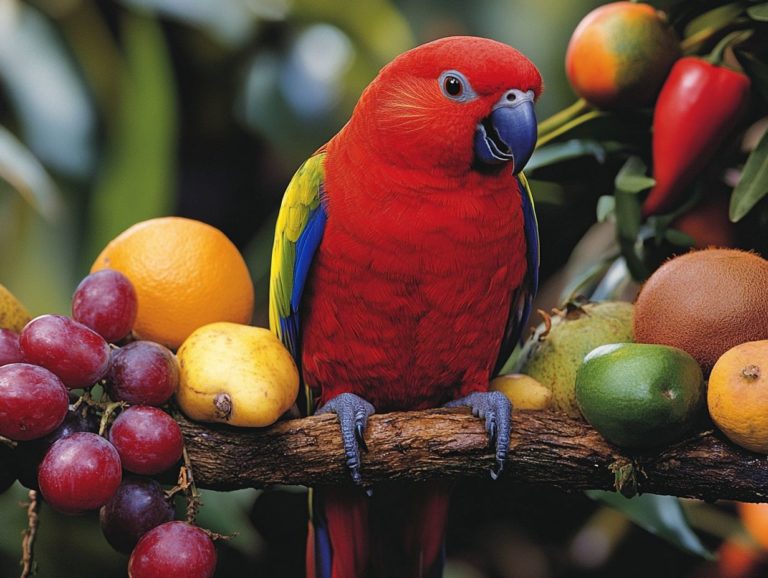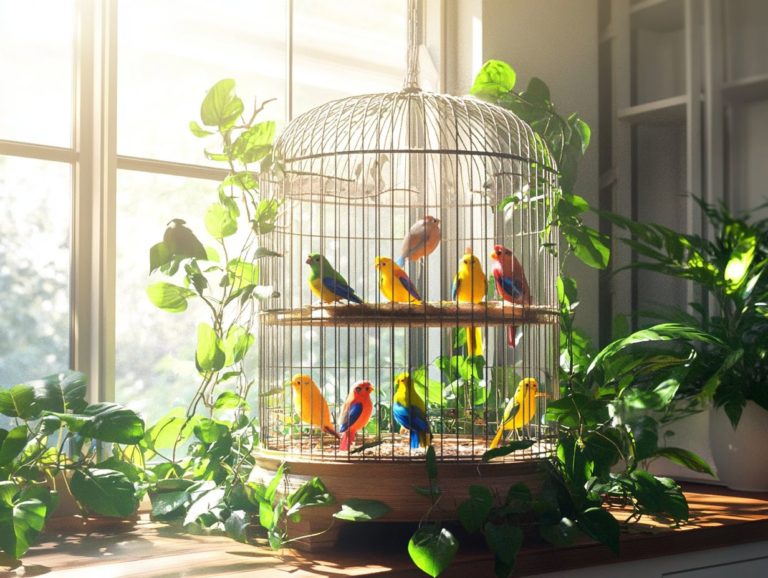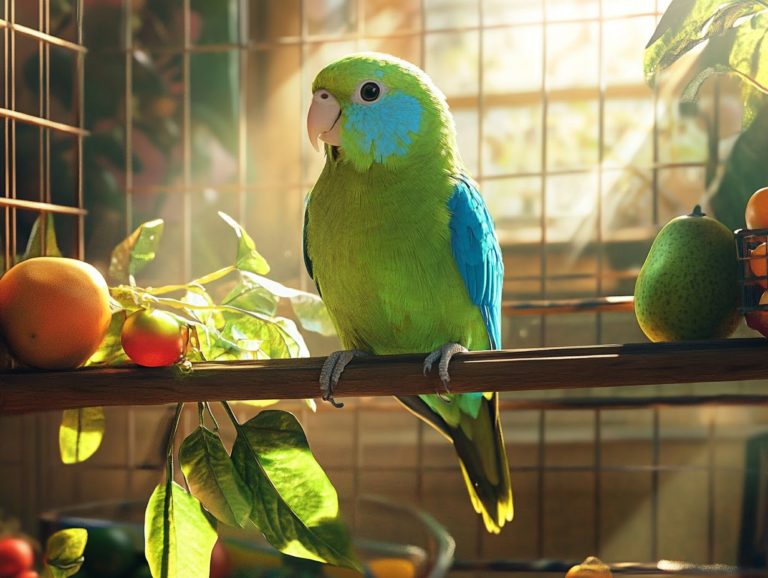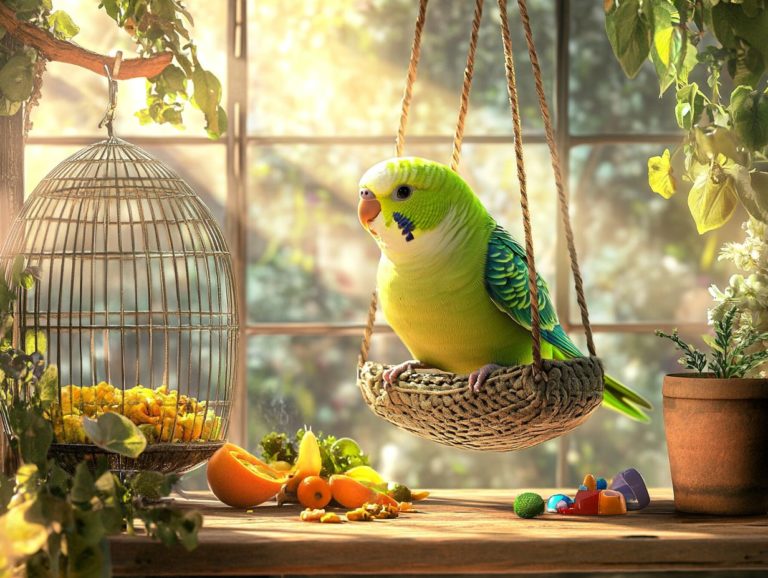5 Common Health Issues in Budgerigars
Budgerigars, or budgies as many affectionately call them, are delightful companions celebrated for their vibrant colors and playful spirits.
Like all pets, they are not immune to various health challenges. It s essential to recognize five common health issues that budgerigars frequently encounter:
- Respiratory infections
- Feather plucking
- Tumors
- Psittacine Beak and Feather Disease (PBFD)
- Malnutrition
Understanding these conditions is vital for you as a budgie owner. Early detection and appropriate care can significantly enhance your feathered friend s quality of life.
Dive in with us as we explore symptoms, prevention tips, and treatment options to keep your budgerigar thriving and joyful.
Contents
- Key Takeaways:
- 1. Respiratory Infections
- 2. Feather Plucking
- 3. Tumors
- 4. Psittacine Beak and Feather Disease (PBFD)
- 5. Malnutrition
- What Are Budgerigars and Their Common Health Issues?
- Symptoms of Respiratory Infections
- Causes of Feather Plucking
- Treatment of Tumors
- Managing Psittacine Beak and Feather Disease (PBFD)
- Importance of Proper Nutrition
- Preventing and Caring for Budgerigar Health Issues
- Warning Signs of Illness
- Proper Care and Precautions for Budgerigars
- Misconceptions About Budgerigars and Their Health
- Actions to Take If Budgerigar Shows Signs of Illness
- Importance of Regular Veterinary Check-Ups
- Protecting Budgerigars from Health Issues
- Long-Term Effects of Ignoring Health Issues
- Important Considerations When Owning a Budgerigar
- Frequently Asked Questions
- What are the 5 most common health issues in budgerigars?
- What are the symptoms of respiratory infections in budgerigars?
- How can I prevent scaly face mites in my budgerigar?
- What should I do if I notice my budgerigar feather picking?
- What is the best diet for a healthy budgerigar?
- Can budgerigars get sick from humans?
Key Takeaways:
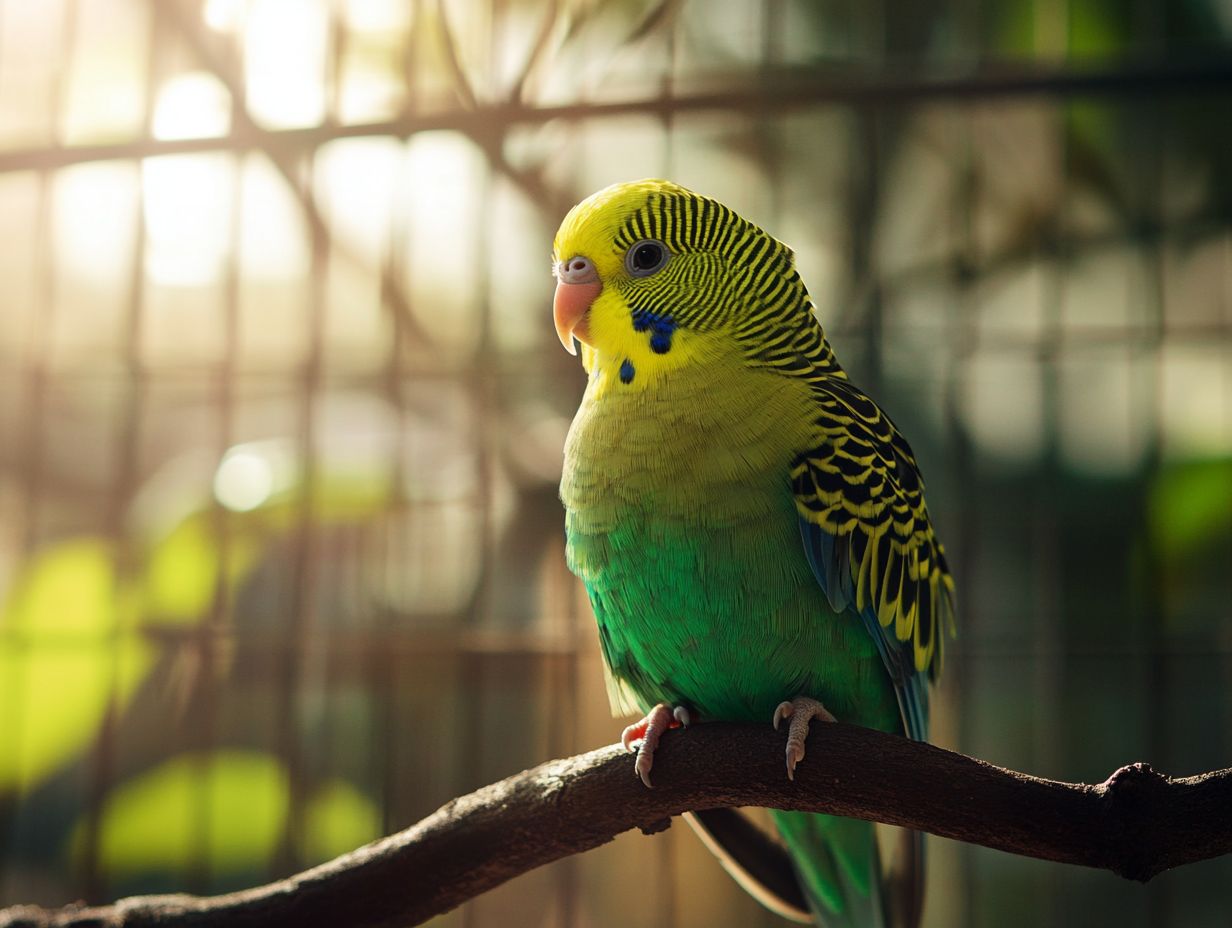
- Respiratory infections are common in budgerigars and can be identified by symptoms such as wheezing and discharge from the nostrils.
- Feather plucking can be caused by stress, boredom, or hidden health issues, and should be addressed promptly to prevent further complications.
- Tumors in budgerigars are most commonly seen in older birds and should be treated by a veterinarian as soon as possible to increase chances of successful treatment.
1. Respiratory Infections
Respiratory infections pose a significant threat to budgerigars, impacting their ability to breathe and overall health. These infections can stem from various factors, including environmental stressors and inadequate hygiene.
Hidden health issues like pneumonia also contribute to respiratory problems. Budgies are particularly susceptible to respiratory issues that, if left untreated, can lead to serious health complications. It s imperative that you seek immediate veterinary care to secure a proper diagnosis and treatment plan.
Common respiratory infections in these birds include:
- Bacterial infections
- Viral illnesses
- Fungal infections
Each presents distinct symptoms like labored breathing, nasal discharge, and loss of appetite. Stay vigilant by observing any changes in your budgie s behavior or appearance, as these can serve as early warning signs of distress.
Implementing effective preventive measures, such as maintaining a clean environment and reducing exposure to drafts, is essential for protecting their health. Regular veterinary check-ups are crucial for identifying potential issues before they escalate, ensuring that your budgerigar receives the precise care it needs to thrive.
2. Feather Plucking
Feather plucking is a distressing behavior often seen in budgerigars. It usually stems from underlying psychological issues or health concerns like mite infestations and nutritional deficiencies.
Understanding the root causes is crucial for you as a caregiver if you want to create a nurturing environment for your feathered companions. Stressors might include a lack of social interaction, sudden changes in routine, or an unbalanced diet.
Regular vet check-ups can help you identify any potential health issues. Modifying the environment to reduce anxiety is also important. This could involve:
- Providing more toys
- Ensuring the cage is placed for optimal lighting
- Engaging in interactive play
By observing behavior patterns and addressing these factors promptly, you can significantly enhance your budgerigar’s well-being and reduce the tendency to pluck feathers.
3. Tumors
Tumors can emerge in budgerigars, presenting a serious health challenge that often leads to symptoms like weight loss, behavioral changes, and noticeable physical abnormalities. It s essential to seek a thorough veterinary diagnosis and explore timely treatment options.
Various types of tumors, such as lipomas and adenocarcinomas, can affect these vibrant birds, each bringing its own set of symptoms. You may notice unusual lumps, difficulty in flying, or even respiratory issues as the condition progresses.
Early veterinary diagnosis is critical, as it can significantly impact the effectiveness of treatment. This may involve options like surgical removal of the tumor or medication to manage symptoms.
Aftercare is equally important for recovery. It requires diligent monitoring of your bird s health, providing a nutritious diet, and creating a safe environment to foster healing. This holistic approach ensures your budgerigar has the best chance of bouncing back to its lively self.
4. Psittacine Beak and Feather Disease (PBFD)
Psittacine Beak and Feather Disease (PBFD) is a serious viral infection that poses a significant threat to your budgerigars. It can lead to alarming feather and beak abnormalities, compromise their health, and unfortunately, significantly shorten their lifespan.
This disease, caused by a type of virus called Circovirus, raises red flags for any bird owner. It spreads through direct contact, contaminated surfaces, and even through the air in crowded environments.
You might notice initial symptoms such as feather loss, abnormal feather development, and changes in beak shape. These issues can severely hinder your bird’s ability to thrive. Long-term effects can include chronic illness, increased susceptibility to secondary infections, and drastic lifestyle changes for your affected budgerigars.
Don t wait! Seek veterinary help as soon as you notice any signs of trouble, as timely diagnosis and supportive care are vital in managing this disease. While there is no cure, treatments such as healthy food options and preventive measures can help safeguard your bird’s overall health.
5. Malnutrition
Malnutrition is a common issue among budgerigars, often due to diets that lack essential nutrients. This can result in various health problems, including vitamin deficiencies that may manifest as lethargy, feather loss, and weakened immune systems.
To help these delightful birds thrive, it s essential to provide a balanced diet that includes a variety of seeds, fresh fruits, and vegetables. Vital nutrients such as vitamins A, D, and E, as well as calcium and protein, are crucial for their well-being.
Many owners, perhaps unknowingly, make dietary mistakes by primarily feeding seed-based diets, which can lead to obesity and nutrient imbalances.
By introducing a diverse array of foods and monitoring portion sizes, you can effectively prevent malnutrition and its related issues, nurturing a healthier, more vibrant pet.
What Are Budgerigars and Their Common Health Issues?
Budgerigars, often called budgies, are charming little parakeets from Australia. Their vibrant colors and friendly behavior make them wonderful companions, but owning one comes with responsibilities.
These lovely birds are prone to various health issues, including respiratory infections, feather plucking, and malnutrition. This means you must provide vigilant care and schedule regular veterinary check-ups to ensure their health.
With a captivating range of colors from bright greens and yellows to deep blues and whites budgies can brighten any home. They thrive in environments where they can interact with you and other birds, showcasing their playful and affectionate personalities.
However, keep in mind that despite their hardy nature, budgies can face health challenges like obesity and tumors, often due to diets lacking essential nutrition. By prioritizing a balanced diet, encouraging social interaction, and maintaining routine health screenings, you can enhance the longevity and happiness of your feathered friends.
Symptoms of Respiratory Infections
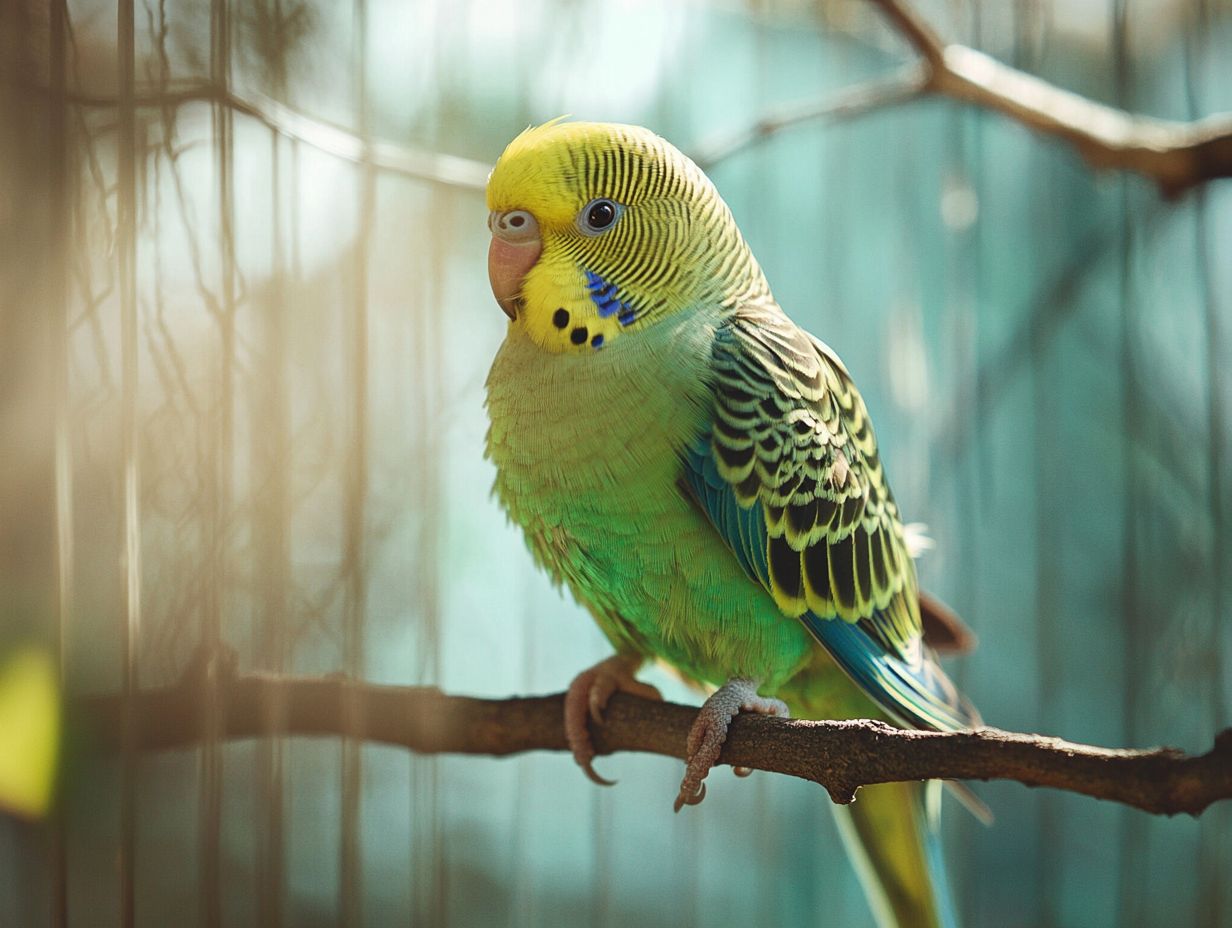
Common symptoms of respiratory infections in budgerigars include persistent sneezing, breathing difficulties, and changes in vocalization. These signs indicate an urgent need for veterinary attention to prevent further complications.
Symptoms can vary in intensity and may accompany other issues like lethargy, abnormal droppings, and a decreased appetite. If you notice changes such as fluffed feathers or excessive head shaking, act immediately!
Creating a stress-free environment and maintaining good hygiene are crucial steps, but consulting an avian veterinarian is the best course of action. A swift diagnosis and treatment can significantly impact the health and recovery of a budgerigar facing respiratory challenges.
Causes of Feather Plucking
Feather plucking in budgerigars can arise from many factors, including health issues like mites or infections, psychological stressors such as loneliness or boredom, and environmental influences that impact their well-being.
These concerns create a cycle where your bird, dealing with discomfort or anxiety, may develop feather plucking as an unhealthy habit. Understanding the differences between health-related issues and behavioral challenges is crucial for effective intervention.
If you suspect health problems, start with a thorough veterinary examination to ensure appropriate treatment. On the other hand, addressing behavioral issues can involve enriching your budgerigar’s environment with toys, fostering social interaction, and providing regular stimulation to reduce stress.
Taking a holistic approach to care enhances both the physical and emotional wellness of these vibrant companions.
Treatment of Tumors
Treating tumors in budgerigars involves a mix of surgical intervention, veterinary care, and ongoing monitoring. Early diagnosis is key to improving outcomes and enhancing your bird s quality of life.
Your journey begins with a thorough examination by an avian veterinarian, who may use imaging tests and biopsies to confirm the presence and type of tumor. Once the diagnosis is established, here are your options for treatment:
- Surgery to remove the tumor,
- Chemotherapy,
- Palliative care.
The specific approach will depend on the tumor’s characteristics and your bird’s overall health. Prioritize follow-up care; regular check-ups allow the veterinarian to monitor your budgerigar s recovery, check for tumor recurrence, and adjust the treatment plan as needed.
This attentive care not only safeguards your budgerigar’s well-being but also brings you peace of mind as an owner.
Managing Psittacine Beak and Feather Disease (PBFD)
Managing Psittacine Beak and Feather Disease (PBFD) in your budgerigars requires a comprehensive approach that includes veterinary treatment, environmental management, and vigilant monitoring to improve these birds’ quality of life.
Your journey often begins with an examination by an avian veterinarian, who can offer insights into effective treatment options, such as antiviral medications or immune support therapies. Regular health check-ups are essential for detecting complications early and ensuring your bird receives prompt interventions.
Supportive care is critical and may include nutritional adjustments, like specialized diets rich in antioxidants to bolster the immune system. Don’t underestimate the impact of lifestyle modifications; creating a stress-free environment filled with stimulation and social interaction can significantly uplift your budgerigar’s overall well-being, helping them adapt and thrive despite challenges.
Importance of Proper Nutrition
Proper nutrition is vital for your budgerigars’ health and longevity. A well-balanced diet prevents malnutrition and helps avoid various health issues, enhancing their overall well-being and vitality.
To achieve this, include a diverse mix of seeds, fresh fruits, vegetables, and specialized pellets that provide essential vitamins and nutrients. For instance, adding leafy greens like kale or spinach delivers crucial calcium and iron, while fruits such as apples and berries supply vital antioxidants.
Avoid processed foods, as they often contain harmful additives. By regularly monitoring their diet and incorporating a variety of foods, you ll meet their nutritional needs, promoting healthy feathering and vibrant energy levels.
Preventing and Caring for Budgerigar Health Issues
Preventing health issues in budgerigars involves active steps that include regular veterinary check-ups, maintaining very clean living conditions, and paying attention to their dietary needs to ensure their overall health and happiness.
Along with routine examinations, you should remain mindful of your birds living environment, making sure it is spacious, well-ventilated, and free from drafts or toxic substances.
Providing a balanced diet, rich in vitamins and minerals along with fresh fruits and vegetables, is crucial for supporting their immune system.
It’s equally important to monitor their behavior for any signs of distress or illness; early intervention can prevent more serious conditions from developing.
By creating a stimulating, safe space and being vigilant about their welfare, you can significantly enhance the quality of life for your feathered companions.
Warning Signs of Illness
Recognizing the warning signs of illness in your budgerigar is crucial for ensuring prompt intervention. Symptoms like fluffed-up feathers, changes in droppings, and shifts in behavior are all signals that something might be amiss and that your feathered friend may need a visit to the vet.
Beyond these visible indicators, keep a close eye on your bird for other critical signs. A decrease in activity, unusual vocalizations, or changes in feeding habits can all suggest underlying health problems that deserve your attention.
Regularly checking for issues like feather plucking or beak overgrowth is an excellent way to catch concerns early on. Create a checklist to monitor your budgerigar’s overall appearance, including eye clarity and nostril cleanliness.
This proactive approach gives you the power to seek timely veterinary consultation, ultimately safeguarding the well-being of your vibrant pet.
Proper Care and Precautions for Budgerigars
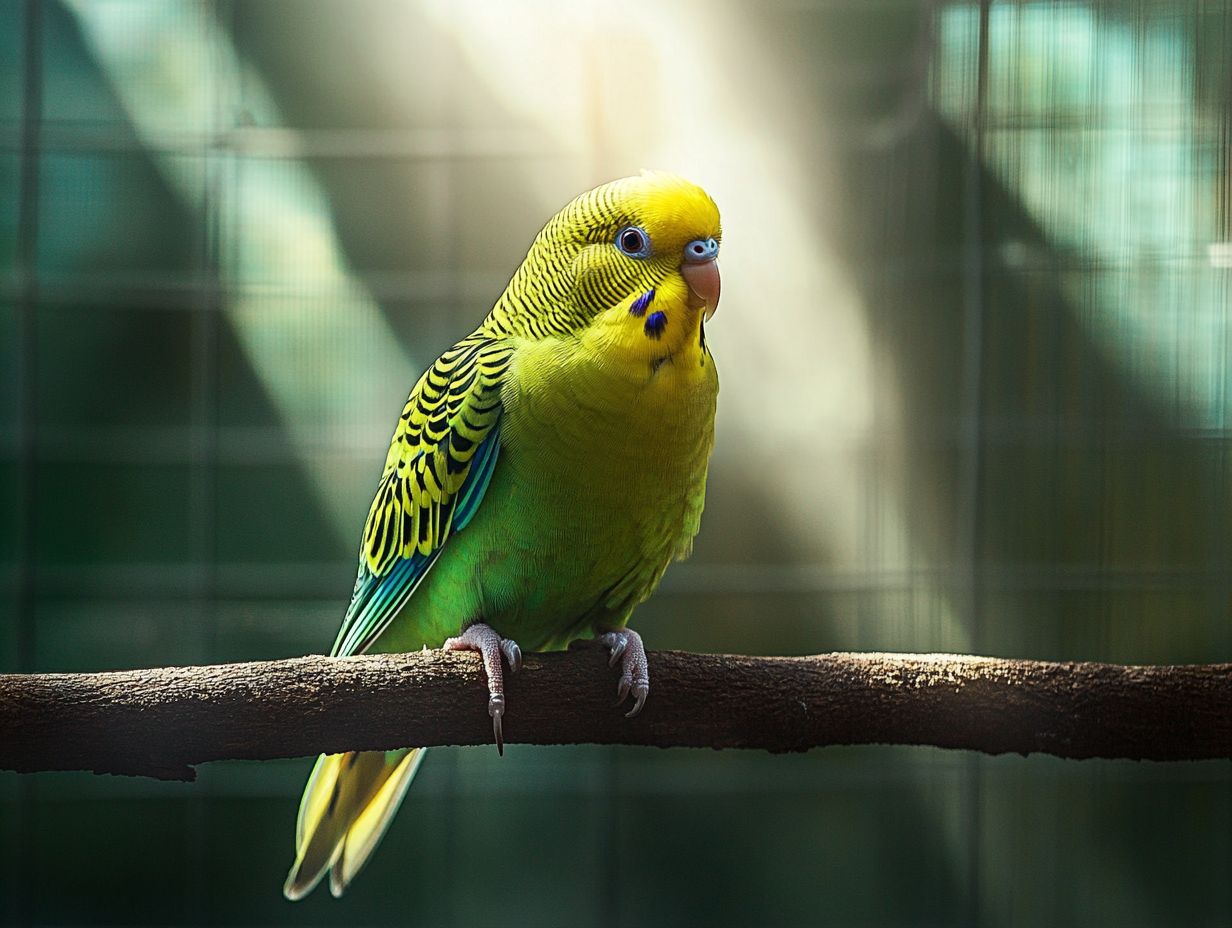
Providing proper care and precautions for your budgerigars means creating a vibrant living environment, upholding very clean living conditions, and ensuring their diet meets all nutritional needs to promote long-term health and ward off diseases.
To achieve this, set up a spacious and safe cage that mimics their natural habitat, complete with perches, engaging toys, and ample room for them to stretch their wings.
Regular cleaning is very important; it helps to deter bacteria and parasites, ensuring they remain healthy and content.
Diet plays a crucial role, too. Offering a balanced mix of seeds, fresh fruits, and vegetables will meet their dietary requirements and boost their overall well-being.
Remember, budgerigars thrive on social interaction, so weaving in playtime and companionship will not only make them feel secure but also significantly reduce stress essential for their psychological health.
Misconceptions About Budgerigars and Their Health
Many misconceptions surround budgerigars and their health, particularly the notion that they are low-maintenance pets. This can easily lead to neglect and inadequate care, ultimately resulting in various common health concerns in parrotlets.
You need to understand the time and effort required to create a suitable environment for these spirited birds. They thrive on fresh water, a diverse diet packed with seeds, fruits, and vegetables, and regular social interaction.
A clean living space both in their cage and the surrounding area is essential for preventing illness. Overlooking these responsibilities can result in serious problems, such as obesity or feather plucking.
Education plays a vital role in this journey, giving you the power to cultivate a healthy, enriching environment that promotes the well-being of your feathered companions.
Act now to ensure your budgerigar stays healthy!
Actions to Take If Budgerigar Shows Signs of Illness
When your budgerigar shows signs of illness like weight loss, fluffed-up feathers, or a shift in behavior acting quickly is essential for their well-being. Reach out to a veterinarian for a thorough examination and appropriate treatment.
In addition to professional help, monitor your bird s environment and daily habits closely. Observing their eating and drinking patterns can reveal important clues. Notice any changes in their usual vocalizations or activity levels to catch potential issues early. Keeping a record of these behaviors can be incredibly useful during your vet visit.
Ensuring your budgerigar has a clean, stress-free environment promotes their overall health.
Timely intervention not only facilitates a quicker recovery but also strengthens the bond between you and your pet, highlighting the significance of attentive care.
Importance of Regular Veterinary Check-Ups
Regular veterinary check-ups are essential for your budgerigars. These appointments allow for the early detection of health issues and ensure your birds receive necessary vaccinations and preventive care.
By scheduling routine visits, you take a proactive approach to your pet’s health. Veterinarians can identify potential problems before they escalate, as birds are masters at hiding their illnesses.
Check-ups can include nutritional counseling and behavioral assessments, which significantly enhance your vibrant companions’ overall quality of life.
Regular veterinary care contributes to a longer lifespan, boosting the happiness and vitality of your pet budgerigars.
Protecting Budgerigars from Health Issues
To protect budgerigars from health issues, focus on overall care. This includes providing a proper diet, maintaining hygiene, and creating a safe, stimulating environment to minimize stress and reduce disease risk.
Prioritize a varied diet that includes seeds, fruits, and vegetables to ensure optimal nutrition, along with fresh, clean water. Regularly clean the cage and accessories to prevent bacterial buildup.
Enhance their living space with toys and perches, along with opportunities for social interaction. These elements significantly contribute to their mental well-being.
Keep a close eye on their behavior. Address any signs of lethargy or unusual activity without delay, as early intervention can prevent serious health concerns.
Long-Term Effects of Ignoring Health Issues
Ignoring health issues in budgerigars can lead to serious long-term consequences, from chronic diseases to a diminished quality of life and even premature death. It’s crucial to be aware of common pet bird health concerns, as this reality underscores the urgent need for prompt veterinary care and ongoing monitoring.
Overlooking signs of illness like changes in behavior, eating habits, or plumage can cause underlying problems to escalate, making treatment more complex and less effective. Early detection is vital; many conditions can be managed effectively if addressed in their initial stages.
Regular veterinary check-ups offer opportunities for vaccinations and screenings, equipping you with crucial knowledge for creating a healthier living environment for your budgerigar.
Paying attention to these issues can be the difference between a vibrant, happy pet and one that suffers in silence, highlighting the significant responsibility of pet ownership.
Summary: Ensure prompt action if your budgerigar shows signs of illness by consulting a vet and monitoring their habits. Regular check-ups and a varied diet are essential for their health. Taking proactive steps contributes to a longer, happier life for your pet!
Important Considerations When Owning a Budgerigar
Owning a budgerigar is exciting! You need to understand their health needs and provide proper care.
Be aware of common diseases to ensure these vibrant birds thrive in a loving environment.
Also, think about the social dynamics of sharing your life with these lively companions. Budgies are social creatures that flourish in the company of others.
Consider getting multiple birds to meet their social needs.
Creating an enriching environment is vital for their well-being. Ensure they have enough space, plenty of toys, and safe perches.
Do your research and prepare thoroughly. This way, you can offer the best care possible for these charming little animals.
Frequently Asked Questions
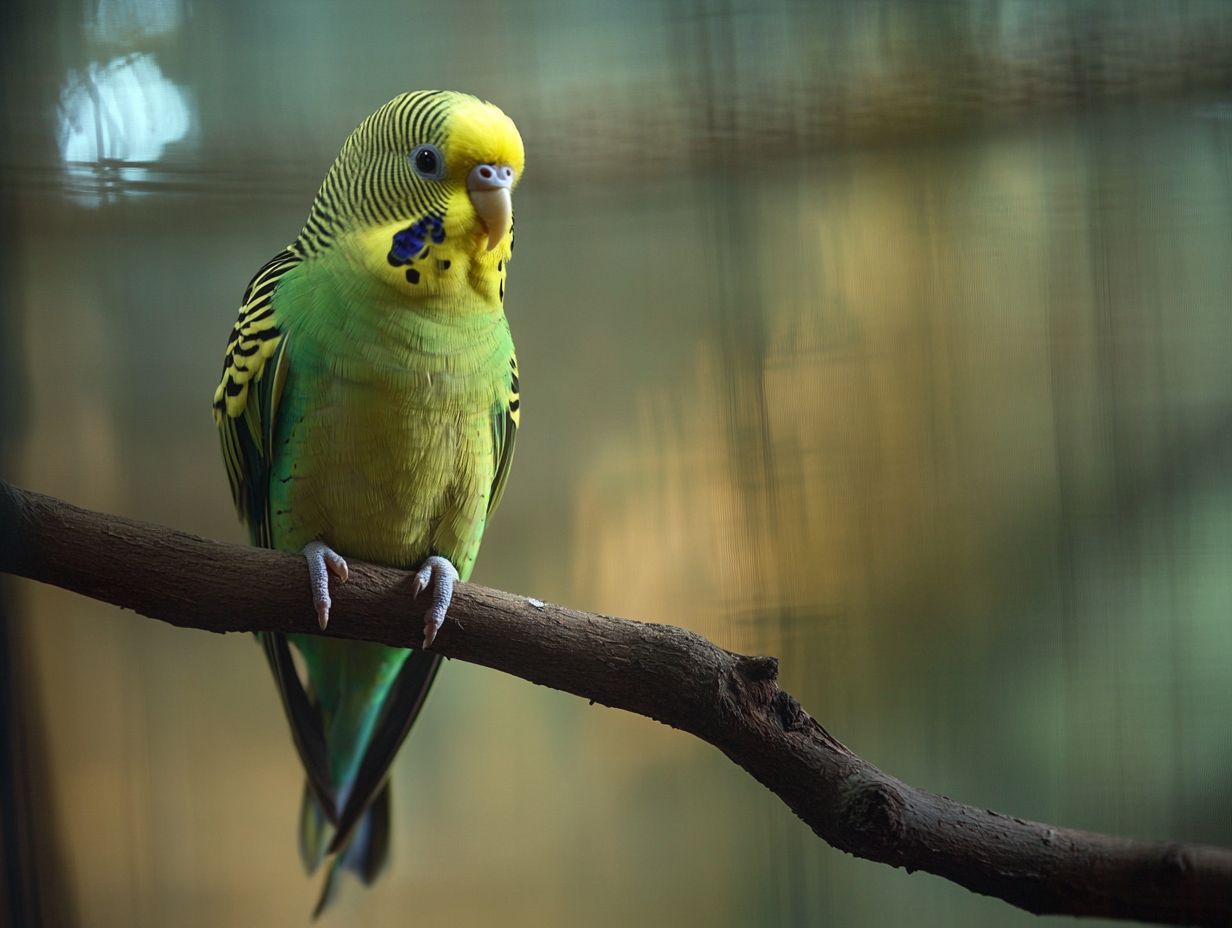
What are the 5 most common health issues in budgerigars?
The 5 most common health issues are respiratory infections, scaly face mites, feather picking, not eating the right foods, and warning signs of illness in pet birds, such as psittacosis.
What are the symptoms of respiratory infections in budgerigars?
Symptoms include sneezing, wheezing, difficulty breathing, and discharge from the eyes and nostrils.
How can I prevent scaly face mites in my budgerigar?
Regularly clean and disinfect your bird’s cage. Provide a healthy diet and environment for them to thrive.
What should I do if I notice my budgerigar feather picking?
First, rule out any medical issues. Then, address stressors in their environment.
What is the best diet for a healthy budgerigar?
A healthy diet includes a variety of fresh fruits and vegetables, high-quality pellets, and occasional treats like seeds and nuts. Always provide fresh water.
Can budgerigars get sick from humans?
Yes! Budgerigars can catch illnesses like psittacosis from humans. Practice good hygiene when handling your bird.

